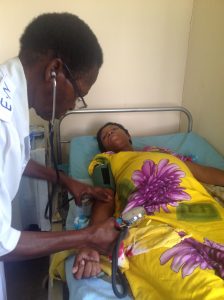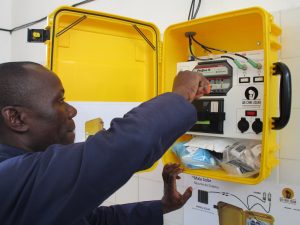By Stuart Mann
The Diocese of Toronto is making a $500,000 donation to the Primate’s World Relief and Development Fund (PWRDF) to improve maternal, newborn and child health in Africa and in Indigenous communities in Canada. A portion of the money will also be used to provide loans to low-income women in Mozambique to help them better provide for their families.
The gift, approved by Diocesan Council on Oct. 20, is coming from the diocese’s Our Faith-Our Hope campaign, which saw donors pledge about $41 million for mission and ministry both inside and outside the diocese. PWRDF is a ministry partner of FaithWorks, the diocese’s annual outreach appeal.

“I am delighted that we as a diocese are supporting this work with women and children,” says Archbishop Colin Johnson. “In Africa, it is the church that has the trusted responsibility for medical and social support of vulnerable people to a degree unknown here. In the North, the needs of families are enormous. We committed a tithe of the Our Faith-Our Hope campaign to share the great resources we have been given to supporting others. This is such great ministry and good news in action.”
According to PWRDF, maternal and child mortality rates are high in sub-Sahara Africa and in Indigenous communities in northern Canada. The maternal mortality rate in Mozambique, for example, is 500 deaths per 100,000 live births. In Canada, it is 12 deaths for 100,000 live births. Among Indigenous peoples in Canada, however, the infant mortality rate is up to twice that of the general population.
The grant from the diocese will help fund PWRDF’s All Mothers and Children Count program, which seeks to reduce illness and death among women of reproductive age, newborns and children of both sexes under the age of five in rural villages in Burundi, Mozambique, Rwanda and Tanzania.
Through its partnerships in Africa, PWRDF will purchase medical equipment for health clinics and maternity wards, construct and refurbish health clinics and nurses’ houses, and construct wells to provide clean water to communities affected by water-borne diseases.
In Canada, PWRDF is working to provide Indigenous communities with midwifery services that are culturally relevant and responsive to their needs and suggestions. It will work with some Indigenous health organizations that have expressed interest in exchanging and sharing expertise and experience on best practices about maternal health, and to support training initiatives for midwives to meet the particular needs of Inuit, First Nations and Metis women.
A portion of the diocese’s gift will also fund PWRDF’s Women Empowerment Project, a micro-finance program that fights poverty by providing access to banking services to low-income women in northern Mozambique. Through this project, 300 women will be able to open bank accounts for less than the equivalent of $5 in local currency and ask for loans to set up small businesses, something they are unable to do with current banking practices Mozambique.
PWRDF plans to spend about $343,000 of the grant on its maternal, newborn and child health programs in Burundi, Mozambique, Rwanda and Tanzania. With $1.9 million in matching grants from the federal government’s Department of Global Affairs Canada, the total investment in those programs will be almost $2.3 million.

“The people of the Diocese of Toronto have not only made these programs stronger and larger because of this grant but are also able to leverage greater contributions from the government of Canada,” says Will Postma, executive director of PWRDF.
PWRDF will spend $50,000 of the grant on its programs for Indigenous women in Canada and $55,000 for the women’s empowerment project in Mozambique. Global Affairs Canada does not provide matching grants for either of these initiatives so the investment from the diocese is critically important, says Mr. Postma.
In order to build awareness of its maternal health and empowerment programs in Africa, PWRDF plans to spend the remaining $52,000 of the grant to send a delegation to the Diocese of Masasi in Tanzania in May 2017 and to improve its website.
PWRDF is proposing that two members of the delegation to Tanzania come from the Diocese of Toronto. The delegation, consisting of eight volunteers and two staff, will visit the people and projects that focus on maternal health and food security. The volunteers will be drawn from the PWRDF Diocesan Representative Network, its board of directors and its youth council.
Members of the delegation will meet and learn from staff in the Diocese of Masasi and people in the communities where the programs are being run. When they return to Canada, they will share their learnings and experiences as champions for the food security and maternal, newborn and child health work of PWRDF.
Mr. Postma thanked the people of the diocese for their generosity and praised the Our Faith-Our Hope campaign. “The fact that faith-inspired giving is translated into really important deeds of mercy and compassion where the needs are highest – that says a lot. It’s very encouraging. Our work is bringing maternal and child mortality rates down and we are making a difference.”
This is a third time the diocese has given a $500,000 grant from the Our Faith-Our Hope campaign for work outside of the diocese. It gave a grant of $500,000 to the Anglican Military Ordinariate in 2013 and a $500,000 grant to the Council of the North in 2014.
For more information about PWRDF’s work in Africa, visit the PWRDF website. To learn more about the diocese’s Our Faith-Our Hope Campaign, visit the Our Faith-Our Hope page